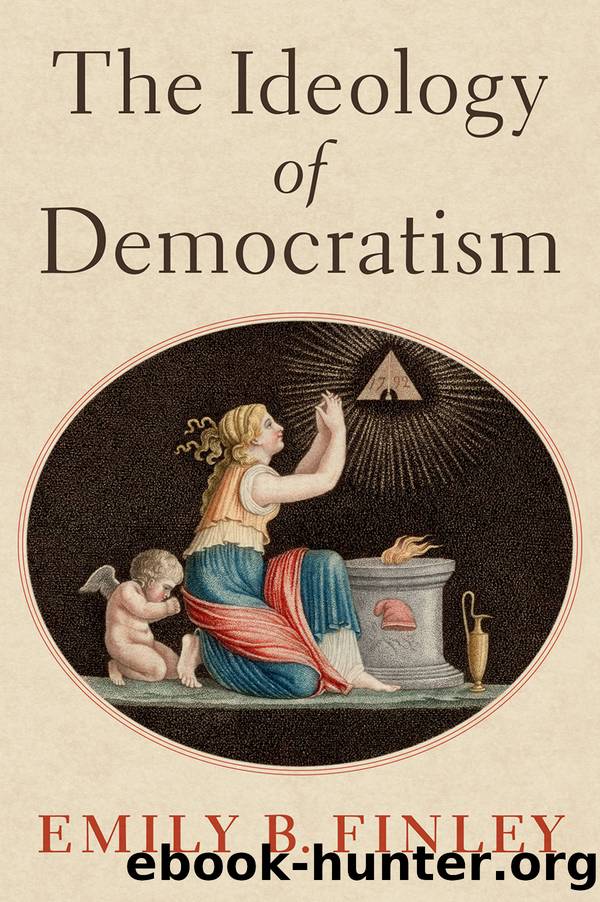The Ideology of Democratism by Emily B. Finley

Author:Emily B. Finley [Finley, Emily B.]
Language: eng
Format: epub
ISBN: 9780197642290
Publisher: OxfordUP
Published: 2022-09-15T00:00:00+00:00
The Autonomy of Reason?
âPolitical reason,â Cohen says, following Rawls, is âautonomousâ and does not need to rely on âan encompassing philosophy of lifeâ in order to articulate a conception of democracy.35 Deliberative democracy believes that citizen deliberation, properly ordered, would have a general purifying effect when reason is permitted to âfloat freely.â36 Parochial beliefs would tend to give way to the common good, which is assumed to be in line with reason. Deliberative democracy agrees with John Stuart Mill that reason and free inquiry ought to be promoted so that the truth can emerge through public filtration of ideas.37 Jefferson also held this belief about the epistemological role of reason; it is why he was so committed to the idea that the people, when permitted to debate freely, would come to the right opinions. The belief that rational inquiry and dialogue can act as disinterested forces in the search for truth and justice is quintessential of Enlightenment thinking and informed its progressive philosophy of history. As citizens become more educated in scientific and rational principles, they will naturally discern what is right and moral. These ideas helped to give life to a new sensibility and ethic that held that morality is not a result of habit and struggle with self, as the older classical and Christian traditions held, but a function of right reasoning. Deliberative democracy follows this Enlightenment tradition, believing that the major obstacle to a thriving democracy is not moral-spiritual but rational and educational.
Deliberative democracyâs first principle is the belief that reason is autonomous and that, through it, we can arrive at shared conceptions of the good, regardless of our personal beliefs. âCitizens must judge, from within [their] separate philosophies,â Cohen says, âthat autonomous political argument is appropriate, and accept, as a public matter, that the diversity of such philosophies recommends an autonomous political reason.â38 Historical circumstance and personal experience, identity, and worldview are not only unnecessary in determining what is politically just but cloud that determination. The procedures and methods of proper deliberation are to guide citizens toward the type of thinking that deliberative democracy believes is âobjectively reasonable.â That such thinking must be cultivated suggests that it is not as natural as deliberative democracy would initially have us believe.
Deliberative democracyâs belief that abstract reason ought to guide discussion places quite a burden on citizens. They must practice âconversational restraint,â listening to and engaging with other speakers on equal terms. A citizen is not permitted to ârespond by appealing to (his understanding of) the moral truth; he must instead be prepared, in principle, to engage in a restrained dialogic effort to locate normative premises that both sides find reasonable,â Ackerman says.39 Using oneâs own experience or philosophical views as justifications for an argument is not acceptable. Amy Gutmann and Dennis Thompson expect âcitizens and officials to espouse their moral positions independently of the circumstances in which they speak. This is consistency in speech and is a sign of political sincerity: it indicates that a person holds the position because it is a moral position, not for reasons of political advantage.
Download
This site does not store any files on its server. We only index and link to content provided by other sites. Please contact the content providers to delete copyright contents if any and email us, we'll remove relevant links or contents immediately.
Collaborating with Parents for Early School Success : The Achieving-Behaving-Caring Program by Stephanie H. McConaughy; Pam Kay; Julie A. Welkowitz; Kim Hewitt; Martha D. Fitzgerald(898)
Entrepreneurship Education and Training: The Issue of Effectiveness by Colette Henry Frances Hill Claire Leitch(665)
Adding Value to Policy Analysis and Advice by Claudia Scott; Karen Baehler(499)
Materializing the Middle Passage by Jane Webster;(496)
Race and American Political Development by unknow(488)
Sociological Perspectives of Health and Illness by Constantinos N. Phellas(478)
American Government and Politics Today by Steffen W. Schmidt Mack C. Shelley Barbara A. Bardes(475)
Human and Global Security : An Exploration of Terms by Peter Stoett(464)
Control Of Oil - Hardback by Kayal(460)
The Disappearance of Rituals: A Topology of the Present by Byung-Chul Han(399)
Advances in Child Development and Behavior, Volume 37 by Patricia J. Bauer(396)
The Catholic Church and European State Formation, AD 1000-1500 by Jørgen Møller(388)
The World According to China by Elizabeth C. Economy(379)
Theories of Counseling and Psychotherapy: A Case Approach by Nancy L. Murdock(370)
Left Is Not Woke by Susan Neiman(367)
Application of classical statistics, logratio transformation and multifractal approaches to delineate geochemical anomalies in the Zarshuran gold district, NW Iran by unknow(362)
Turkey's Relations with the West and the Turkic Republics: The Rise and Fall of the Turkish Model by Idris Bal(353)
Cross-Cultural Child Development for Social Workers by Lena Robinson(348)
Japan's Ainu Minority in Tokyo by Mark K. Watson(331)
